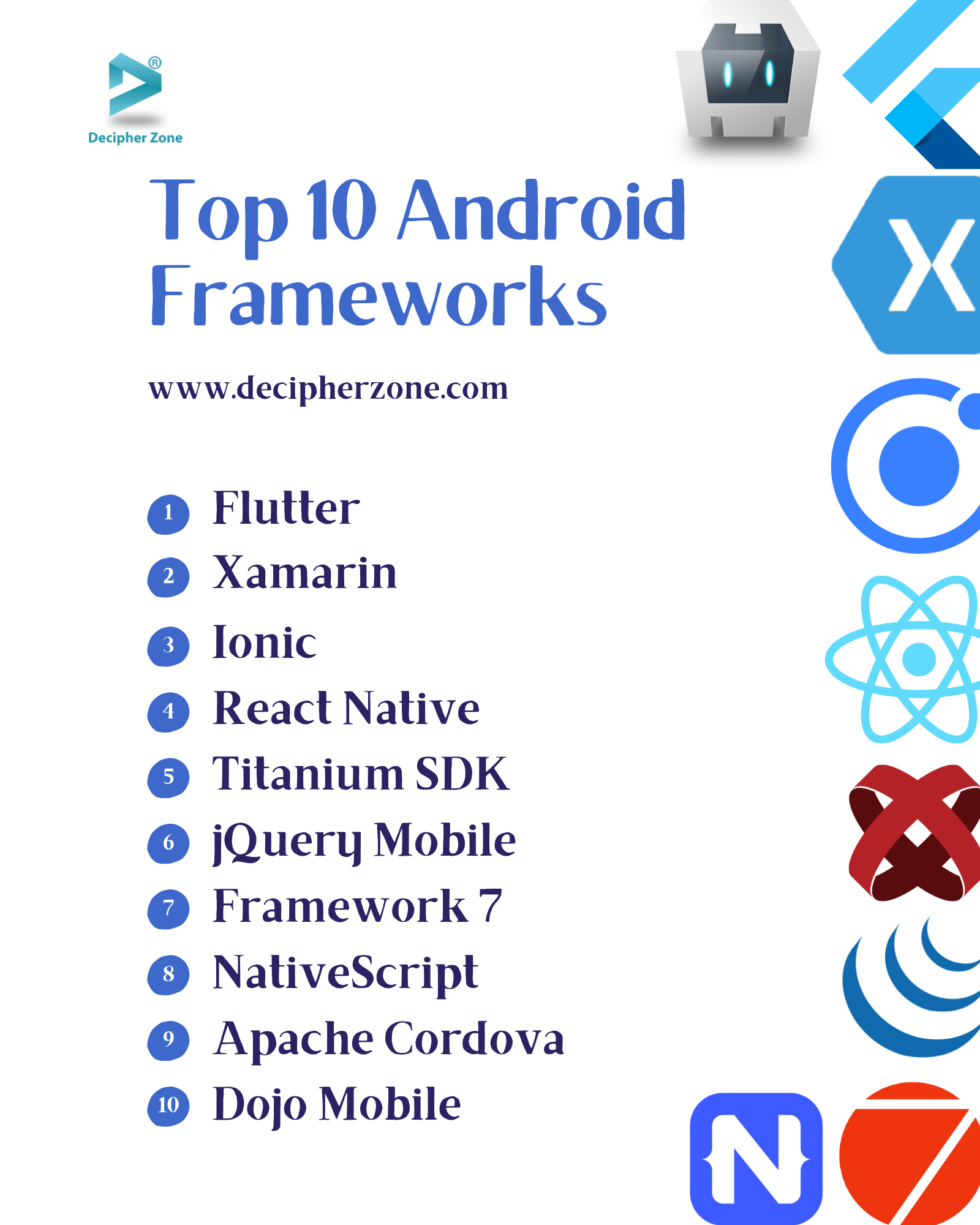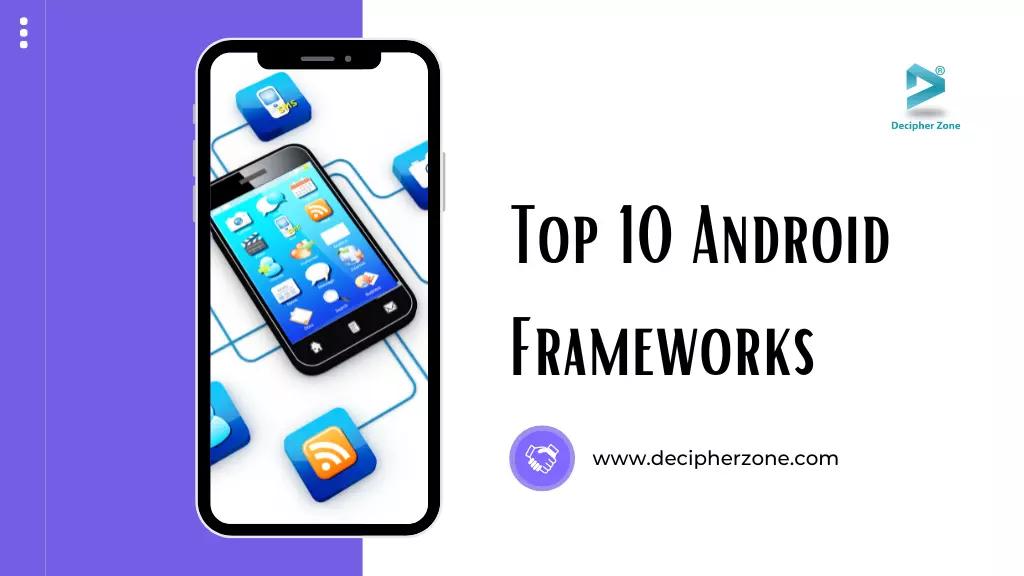Top 10 Android Frameworks for App Development in 2024. Android market size has been the leading operating system for mobile devices. According to Statista, in the third quarter of 2023, Android had a market share of 70.5% globally. For a business that wants to reach a wider audience and gain success, developing an Android-native mobile application has become essential.
However, developing an Android app from the ground up can be difficult. So, in this blog, we will share the top 10 Android frameworks that will make your work easier and faster.
What are Android Frameworks?
An Android framework is a software toolkit that enables developers to design and build Android applications that meet the client's requirements effortlessly. It is a software library that gives a fundamental structure and acts as a foundation for developing Android apps, so the developers don’t need to start from scratch.
An Android framework comprises pre-made templates, components, and structures that simplify application development. Also, before opting for a framework, always check its cross-platform compatibility, features, base language, performance, and maintenance support.
Read More: Common Features of Mobile Apps and their Benefits
Top 10 Best Android Frameworks for App Development in 2024
Here is the list of top 10 android frameworks for app development in 2024 that you can go for depending on your requirements are as follows:
-
Flutter
-
Xamarin
-
Ionic
-
React Native
-
Titanium SDK
-
jQuery Mobile
-
Framework 7
-
NativeScript
-
Apache Cordova
-
Dojo Mobile
1. Flutter
Developed by Google, Flutter is an open-source user interface development kit to build cross-platform apps through a single codebase. Using Flutter, one can create Android, iOS, web browsers, Linux, Windows, and macOS applications.
It allows application deployment to multiple devices from one codebase. Flutter offers a developer toolkit, automated testing, and widgets to build high-quality products.
As it only has a single codebase that renders into native code for each platform, it becomes cost-effective and faster for developers to build native-like applications. Some popular apps built on Flutter are Google Pay, Google Ads, Groupon, Cleveroad, and eBay Motors.
Features:
-
Platform Embedding
-
Easy Learning Curve
-
Firebase Integration
-
Hot Reload
-
Widget Library
-
Native Performance
-
Expressive UI
-
Rich Animated Support
-
Automated Testing
Read More: Flutter App Development
2. Xamarin
Owned by Microsoft, Xamarin is an open-source platform used to build performant and modern apps for Android, Windows, and iOS. It allows developers to create native apps through shared UI code written using XAML or C#. It is an abstraction layer that manages shared code communication with underlying code.
Built on top of .NET, Xamarin automatically handles garbage collection, memory allocation, and interoperability. Applications built on Xamarin.Android compiles C# code into Intermediate Language which is then compiled Just-in-Time to a native one at the time of the launch.
Features:
-
Interoperability with C, C++, Object-C, and Java
-
Modern Language Constructs
-
Underlying SDKs’ Complete binding
-
Mobile Cross-Platform Support
-
Thorough Testing and App Performance Monitoring
Read More: Native vs Cross Platform App Development - A Comparison
3. Ionic
Ionic is an open-source software development kit (SDK), a UI toolkit for building high-performing, modern, cross-platform, lightweight mobile applications and progressive web apps (PWAs) using a single codebase. Some of the languages that you can use to build an app with Ionic are JavaScript, HTML, CSS, and TypeScript.
Features:
-
Support for JS Frameworks such as React, Vue, and Angular
-
Adaptive User Interface (UI)
-
Built-in Dark Mode
-
Native-like Gestures
-
100+ UI Components
-
Automatic Dead Code Removal
-
High-Performant and Faster App Development
-
Developer-Friendly Tools
4. React Native
Developed by Meta, React Native is an open-source framework that empowers developers to build robust, highly interactive apps if they have JavaScript knowledge. It can be used to create a new project from the ground up or in an existing app to add some features.
Also, it comes with a fast refresh rate that allows developers to see the changes instantly after saving. Some of the brands that have adopted React Native include Skype, Microsoft, Instagram, Uber, and Facebook.
Read More: Why Use React Native for Your Mobile App Development?
Features:
-
Support for NPM Libraries
-
Hot and Live Reload
-
Code Reusability
-
Reusable Code
-
UI Focused
-
Easy Third-Party Plugin Integration
-
Fast Refresh
-
Community Support
5. Titanium SDK
It is an open-source cross-platform framework used to create native mobile applications for Android and iOS using JavaScript. Titanium provides access to numerous non-visual and native UI components in app development. Using Titanium SDK, developers can create full-featured and immersive mobile apps.
Features:
-
Cross-platform APIs
-
Native UI Components Access through Hyperloop
-
Transparent Access to Native Features
-
Alloy framework for MVC-based app development

6. jQuery Mobile
It is a touch-optimized, HTML5-based framework designed to build responsive mobile applications and websites. jQuery mobile offers an AJAX-powered navigation system and UI widgets that are touch-friendly and support animated transitions in the pages. Some of the brands using jQuery mobile are Dell, NEC corporation, Tech Mahindra, and the Coca-Cola company.
Features:
-
Easy to learn
-
Compatible with all major platforms
-
Lightweight
-
Limited dependencies
-
HTML5-driven configuration
-
Touch-Optimized UI Widgets
-
Automatic screen scaling based on the device
-
Allows custom theme creation
Read More: Types of Mobile App Development
7. Framework 7
Another open-source cross-platform framework that can also be used as a prototyping tool. Framework7 helps developers in creating native-like apps for mobile, web, and desktop.
In addition to HTML, CSS, and JavaScript, developers can use any tool they desire. Framework7 provides structured data, component syntax, and data bindings and offers the simplicity and power of popular JS frameworks like React, Vue.js, and Svelte.
Features:
-
Rich in UI elements
-
Support Multiple Platforms
-
Free to use
-
Built-in FastClick Library to Control UI-touch delay
-
Built-in Grid System Layout
-
Dynamic Page Load via Flexible Router API.
Read More: Most Popular Types of Software Development
8. NativeScript
An open-source mobile app development platform for Android and iOS, NativeScript offers platform APIs to the JS runtime for a rich app development experience in TypeScript. It allows developers to build apps using JavaScript and any language that trans compiles to JavaScript as well as frameworks like Vue and Angular.
Features:
-
Responsive and Quick Native-build Android app development
-
Easy to grasp
-
Supports JavaScript and related language and frameworks
-
Feel and performance of a natural platform
-
JavaScript Skill Reuse
-
Fully Open-Source
Read More: Benefits of using JavaScript for Web Development
9. Apache Cordova
Created by Nitobi, and rebranded as PhoneGap, Apache Cordova is an open-source framework that allows developers to use standard web technologies for cross-platform app development.
It wraps an app into a native container that has access to multiple platforms and relies on API binding to access capabilities like sensors, network status, etc. of each device.
Apache Cordova is popular among web developers who want to deploy a web app for various app store distribution, and mobile developers who want to make the app cross-platform compatible.
Read More: Top 5 Frameworks for Cross Platform App Development
Features:
-
Debugging Capabilities
-
Extensive Platform Support
-
Custom UI Design
-
Multiple Native Plugins
-
Write Code Once - Run Everywhere
10. Dojo Mobile
Dojo Mobile is a robust and powerful HTML5 framework that offers a wide range of widgets to help developers build web applications that are optimized for mobile devices.
With its lightweight design, Dojo Mobile ensures that the end-users have a seamless and smooth user experience while interacting with the web app.
The framework is highly customizable, making it easy for developers to tailor the widgets to suit their specific needs and requirements. Overall, Dojo Mobile is an excellent choice for developing mobile web applications that are responsive, reliable, and performant.
Features:
-
Theme support
-
Widget Library
-
Transition and Responsiveness
-
Touch Events
-
Multiple-Device Compatibility
-
MVC Architecture
Conclusion
With so many Android frameworks having their own uniqueness and advantages, it can still be perplexing to go for the right one. However, by considering your project requirements while eliminating the ones that don’t suit them, you can efficiently choose the framework that aligns with your needs.
If you are a business seeking Android app developers with years of experience and expertise using different frameworks, tools, and technologies, contact our experts now!
FAQS: Top 10 Android Frameworks
What is an Android framework?
An Android framework is a software toolkit that enables developers to design and build Android applications that meet the client's requirements effortlessly.
How do I choose a framework for Android app development?
Before opting for a framework, check its cross-platform compatibility, features, base language, performance, and maintenance support.
Why is the Android framework crucial?
Android framework is crucial for app development because, as a software library, it provides a foundation for developing Android apps, thereby reducing the need for developers to start over.

